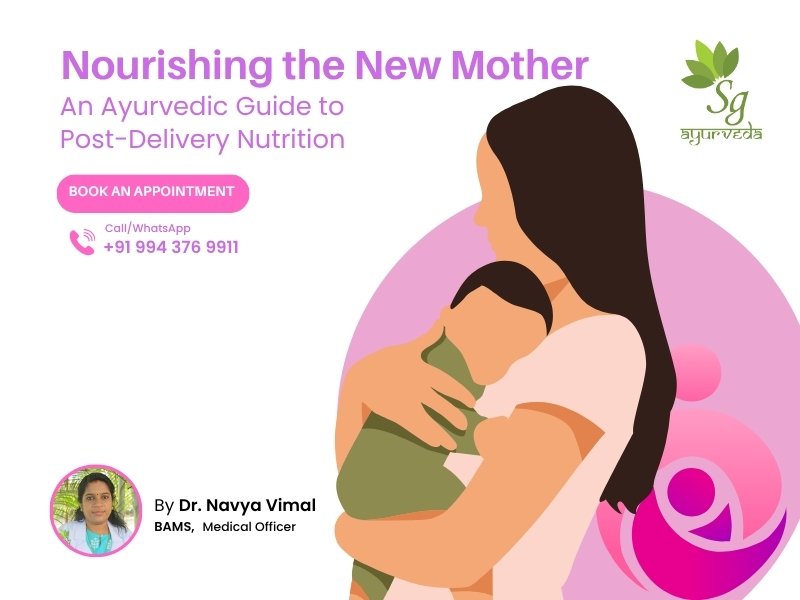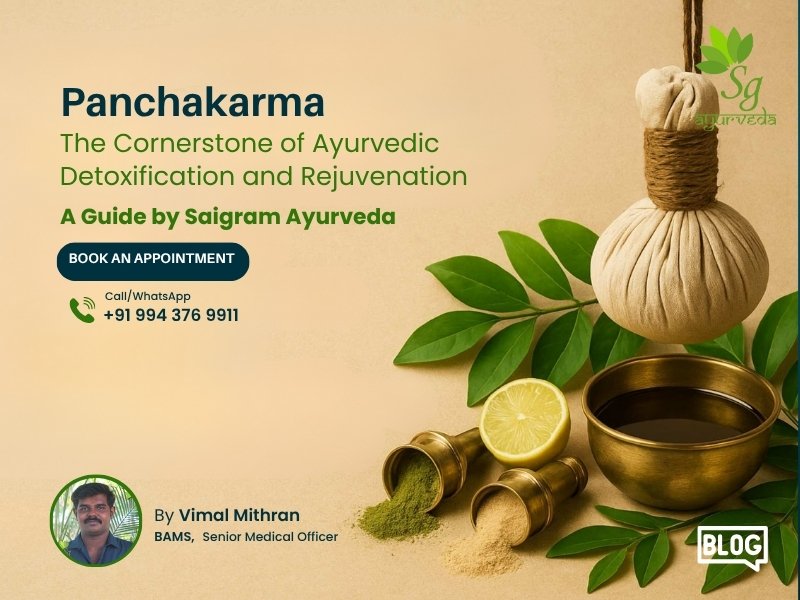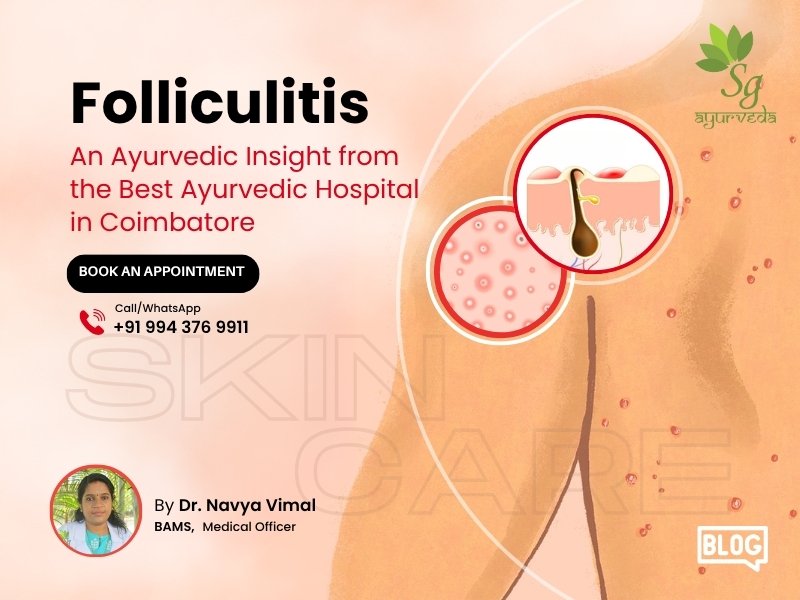Folliculitis: An Ayurvedic Insight from the Best Ayurvedic Hospital in Coimbatore
Skin issues often appear minor on the surface, yet they can disrupt our comfort and confidence significantly. One such condition is Folliculitis, a commonly misunderstood skin inflammation that may become chronic or recurrent if not managed appropriately. At Saigram Ayurveda Hospital and Research Institute, recognised as the best Ayurvedic hospital in Coimbatore, we approach conditions like Folliculitis not just as isolated skin concerns but as manifestations of internal imbalance—something Ayurveda has long addressed through holistic healing.
Drawing from my clinical experience in treating skin ailments using classical Ayurvedic protocols, I invite you to understand Folliculitis through a broader, integrative lens.
What is Folliculitis?
Folliculitis refers to the inflammation of the hair follicles, typically caused by bacterial, fungal, viral, or parasitic infections. In modern dermatology, Staphylococcus aureus is identified as the leading cause, especially in Bacterial Folliculitis, often seen in areas like the beard region, scalp, or thighs.
From an Ayurvedic perspective, such conditions arise due to vitiation of Pitta and Rakta dhatu, leading to Dushti (toxicity) in the skin layers (
Twak). Excessive heat, sweat accumulation, improper hygiene, or external irritants aggravate these doshas, causing local inflammation, pustules, and itching.
Types of Folliculitis – Modern vs. Ayurvedic Correlation
1. Bacterial Folliculitis (Barber’s Itch): Usually occurs due to poor hygiene, infected razors, or excessive sweating. Ayurveda correlates this to Pitta-Kapha Dushti with possible Sannipata involvement in chronic cases.
2. Gram-Negative Folliculitis: Seen in individuals overusing antibiotics, resulting in weakened immunity and microbial imbalance. Ayurveda addresses this as Agni Mandya (weakened digestion/metabolism) and Ojas Kshaya (low immunity), calling for systemic correction.
3. Hot Tub Folliculitis: Caused by prolonged exposure to contaminated water. In Ayurveda, Snana (bathing) in impure water is discouraged as it vitiates the skin’s natural balance (
Twak Prakriti), leading to such conditions.
4. Fungal Folliculitis (Malassezia furfur): Common among adolescents and those with oily skin. Ayurveda attributes this to Ama accumulation (toxic build-up) and Kapha-Pitta imbalance, often worsened by poor diet and lifestyle.
5. Viral or Parasitic Folliculitis (e.g., Herpes, Demodex): These are seen in people with lowered immunity, such as diabetes or HIV patients. Ayurvedic management focuses on Rasayana therapy (rejuvenation), enhancing immunity through herbs like Ashwagandha, Guduchi, and Amalaki.
Causes and Triggers – Modern Understanding, Ayurvedic Explanation
Folliculitis is more than a skin-level problem. Common triggers include:
- Excessive sweating: Triggers Pitta aggravation
- Shaving with unclean razors: Causes micro-injuries, allowing pathogens to invade
- Prolonged antibiotic use: Leads to Rasa Dhatu Dushti and weakened digestion
- Hot tubs, spas, pools: Aggravate Kapha-Pitta and introduce external toxins
- Immunocompromised states: Viewed in Ayurveda as Ojas Kshaya
Ayurvedic Approach to Folliculitis At Saigram Ayurveda Hospital, we adopt a threefold approach:
1. Internal Detoxification – Shodhana Chikitsa
- Virechana (Purgation) is advised to eliminate aggravated Pitta
- Herbal decoctions like Manjishtadi, Kwatha, Sarivadyasava, and Patolakaturohinyadi Kashayam are administered to purify blood and cool internal heat
2. External Therapies – Shamana Chikitsa
- Application of neem-based lepas (herbal pastes)
- Cleansing with Triphala decoction or Turmeric water
- Use of Aloe vera gel, Chandana (sandalwood) and Kumari extracts to soothe and heal lesions
3. Raktamokshana (Bloodletting)
- May be considered in chronic cases
4. Dietary and Lifestyle Regulation (Pathya-Apathya)
- Avoid spicy, oily, and fermented foods that increase Pitta
- Include cooling, bitter foods like cucumber, gooseberry, bottle gourd
- Encourage hydration and stress management practices such as Abhyanga (oil massage) and Shirodhara where needed
5. Preventive Care – The Ayurvedic Way
Folliculitis prevention is possible through daily Ayurvedic practices:
- Dinacharya (daily regimen): Cleansing skin with herbal water, using medicated oils
- Personal hygiene: Use of clean towels, razors, and avoidance of shared items
- Building immunity: Regular intake of Guduchi, Turmeric, Triphala
- Shaving hygiene: Avoiding frequent shaving or doing it with proper sterilization
Why Ayurveda Offers the Most Holistic Care for Folliculitis
Folliculitis, while often treated topically in modern medicine, has deeper roots that Ayurveda identifies and addresses through internal purification, immune enhancement, and personalized lifestyle corrections.
At Saigram Ayurveda Hospital and Research Institute, the best Ayurvedic hospital in Coimbatore, we provide compassionate, root-cause-driven care. Whether your folliculitis is recurrent, treatment resistant, or linked to underlying metabolic issues like diabetes, Ayurveda offers sustainable healing without side effects.
If you're looking for an authentic and integrative way to manage your skin condition and restore your internal balance, we welcome you to consult with us.
Book an Appointment
Blog By Dr. Navya Vimal
BAMS, Medical Officer



